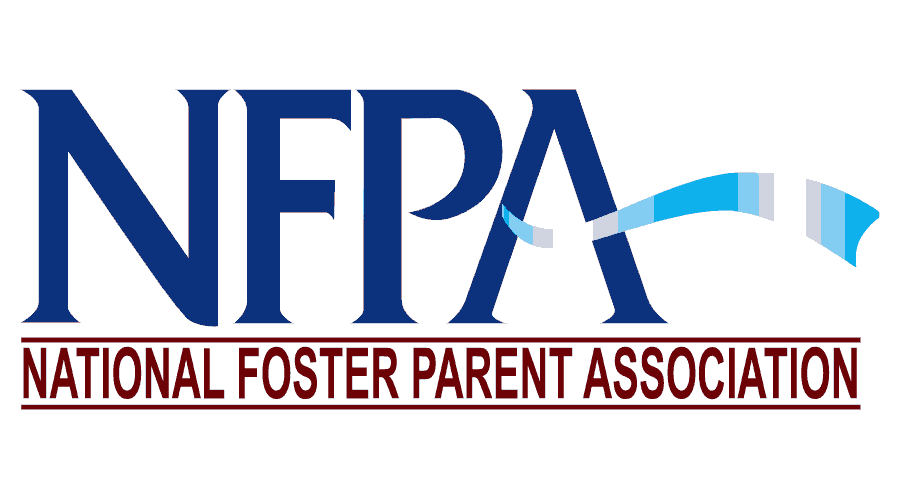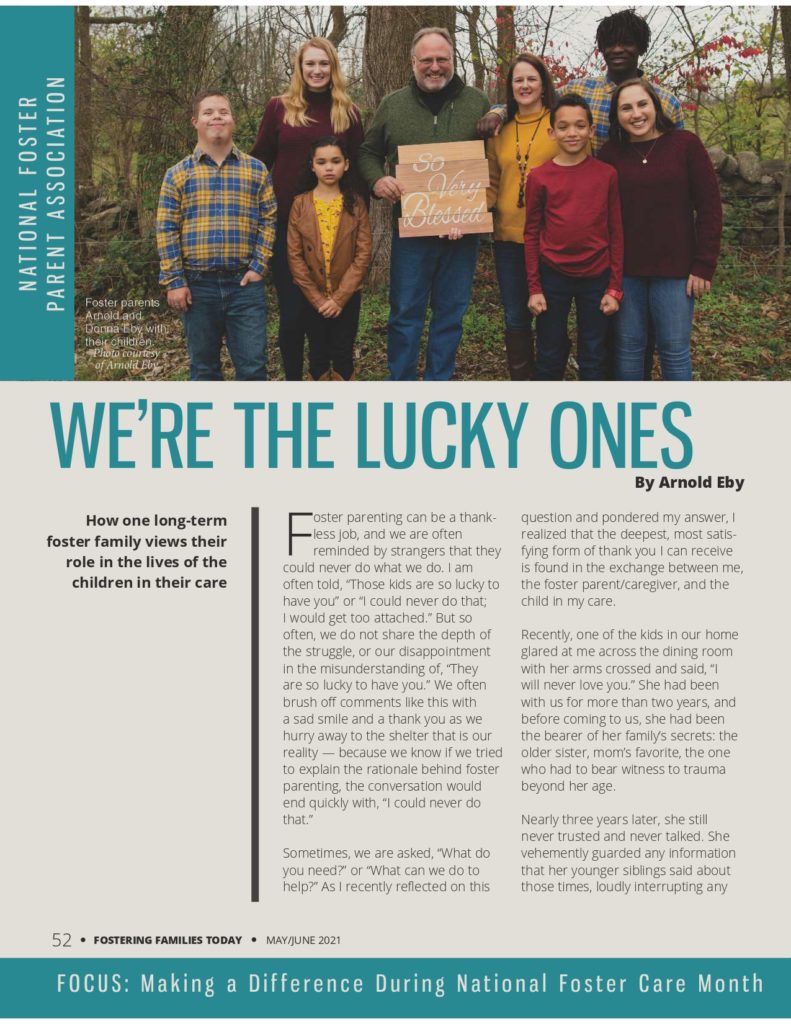Your cart is currently empty!
National Foster Care Month 2023: A Powerful Interview with Arnold Eby of The NFPA

Welcome to May! FASD United would like to highlight an important appreciation month that has strong ties to the community- National Foster Care Month! In celebration, an interview was conducted with NFPA Executive Director and experienced foster/adoptive parent, Arnold Eby. The National Foster Parent Association is a national-level nonprofit organization with a mission to be a respected voice for foster, kinship, and adoptive families through networking, education, and advocacy. Eby stepped into his role in January 2022, and has served 22+ years as foster parents with his wife Donna. However, they are “wrapping up that chapter” of their lives as he fully steps into a national role and all it entails, especially considering travel. He describes his job as “bringing together stories, situations, and hopefully then articulating some solutions that are desperately needed to enhance outcomes for kids in care and the families that care for them.”

Although Arnold previously didn’t desire children, 150+ kids have lived in the Eby home, and four (ages 21, 20, 13, 11) were adopted into their family; in addition, the couple has two biological daughters. He notes how this range keeps him “very focused on the struggles and supports that are needed to not only be successful as a foster parent, but also an adoptive parent.” He has been involved at the local, state, and national level throughout his life, and “now as the ED, I think I’m able to put all of those things that I learned at each step along the way and roll it into now, being a voice at the national level that says all families need supports. It’s not only the biological family, it’s the foster family, certainly the adoptive family afterwards, or it’s the grandfamilies and kinship families…” Each have an important role to play for the kids that are in care. Community is a powerful tool for advocacy and understanding that the FASD collective know all too well.

Eby recalls a 2021 article about his family in Fostering Families Today magazine to express his thoughts: “The understanding that comes from realizing, identifying, and appreciating the community that it takes to be successful,” Donna and Arnie have tons of love to give, but “it’s that we also are attentive to the needs of the children we’ve either fostered or adopted, and then we find ways to connect them to supports…it’s the culmination of community that opens the world to them.” He then fondly recalled a story of his (then) ten year old daughter who was overheard at her brother’s soccer game telling a friend that she “is living her best life, ever.” This moment was defining and moving to Eby who expressed that “in spite of their circumstances, in spite of their difficulties, the barriers or boundaries or the things that they carry that are no fault of their own, we have the incredible, unique opportunity to open a world for them that far surpasses what we as an individual could do.”
However, the world of foster care is not all sunshine and rainbows, there are serious realities that demand attention. The work itself can be exhausting, hurdles and pitfalls do present themselves. For example, “the aftermath of visits with biological parents, even though they’re incredibly necessary and an anchor in ways for the children, can be traumatic sometimes.” He also mentions certain educational barriers, along with frequent visits from social workers and involved parties. Alas, Eby explains that while sometimes challenging, these things can be imperative pieces of strengthening the aforementioned communities and often are “opportunities to connect.” One of the things he notes as a consistent struggle for caregivers is how they tend to not “ask for help soon enough” because “it’s not easy to ask for help and help is not always as readily accessible.” When aid is not available, foster and adoptive parents can find themselves overwhelmed or isolated, similarly to how caretakers in the FASD community may feel.
“Go in with your eyes wide open, it’s not easy, it’s not glamorous.” Choosing to become a foster parent can be incredibly fulfilling, but comes with caveats and stipulations, just as all types of caregivers recognize. “For me, it’s a reality to say I chose this, and then understand that through it I need to find the supports that I need, just like my children.” One of the most influential aspects of support, Eby claims, is listening. Not all empathy requires sympathy: “Oftentimes somebody comes and they want to talk about a situation or a problem, they’re not asking me to solve it, they’re asking me to listen, to say I hear you and I care.” It is in shared, open-minded spaces (physical, mental, or emotional) that people tend to feel most seen and heard. “You have to find your people. It will not be the people you think it is the day you sign up.” Eby mentions examples in his church, friend group, and family who have become vital sources of care. He additionally mentions those “that think you are flat out crazy, who don’t understand.”
Arnold Eby would say this to anyone interested in entering the foster care world, “position yourself so that you can make the decision that’s best for the child in your care, and your personal family.” This will come with choosing not to worry about what some may have to say regarding your choices. “There will be times you miss dessert at a function because it is just time to go” for the best interest of the child, and people may say, “”well just make them stay” well, if something at that event triggers them, it’s not fair to them.” Cases like this are found in the FASD community as well, adapting for the well-being of one’s child (biological, foster, or adoptive) is the goal. He finishes this thought with words of advice to external sources, “don’t do what you think is what I need.”
Eby believes all families require supports to be successful- parenting is hard. However, it may be easier for foster parents to feel a sense of misunderstanding and miscommunication in regards to their foster children, as caregivers of kiddos with neurodiversity may feel. He suggests that “If a child lashes out or has a fit,” it’s not always about you, “you have to realize that after time, they’re finally feeling safe enough and connected enough to be able to express some of those feelings, even though it may be through anger, it’s things they are not yet able to (fully) articulate.” Over the past 20 years he is able to recollect numerous instances of this, and looking back understands, “wow, this isn’t about me, this is about a personal journey that they’re on that is an incredible stepping stone into unlocking their future and their ability to communicate what they need to be successful.” Of course, hindsight may be 20/20, but 20+ years of experience doesn’t hurt either.
As Arnold Eby transitions out of his foster guardian role he has noticed some important factors. “I get the opportunity to share and help foster parents and advocates to understand that yes their story is necessary, it’s powerful.” Stories have the power to change the world, but at the national level, “to go from a story to a solution, we have to find out what some of the surrounding circumstances are because agencies are different, states are different, even in a state there are very different practices in a city than there are in rural areas.” Gathering a comprehensive picture of the foster care system and its community allows for people to turn their stories from situations and circumstances into solutions. “Solutions are desperately needed, but stories don’t always get us to solutions, we have to be able to help advocates through the process of clarifying their story, and then roll that to a solution.” he finalizes his response by saying, “it isn’t always that easy, there are no simple answers.”
“I never dreamed that there was a national platform for me…
So what can people do to help celebrate and recognize this crucial month and caregiving system? Logistically speaking, Eby mentions vital outlets like fundraisers, walks and runs, clothes closets, meal trains and food banks. He also mentions that as a human being on a fundamental level, “I need people to listen, to understand that my world is forever different.” This is a real and life-changing opportunity, “and by recognizing it, listening to it, being impacted or transformed into somebody who wants to work for solutions, that’s the best gift that anybody could give. Listen, learn, and engage.”
S 1313 is the bill NFPA and others are fighting to pass, check it out!
Know somebody who could use some Foster Care support?
Know somebody who could use some Foster Care community?
Know somebody who could use some FASD support?
Know somebody who could use some FASD community?
Thinking of becoming a foster parent? Click here
